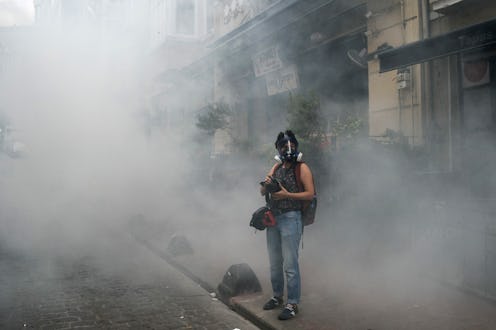Authorities have yet to report whether ISIS was involved in the attack on Istanbul's Atatürk Airport on Tuesday. Witness accounts of two explosions followed by gunshots has been confirmed by a Turkish official, Reuters reported. The Turkish justice minister confirmed that ten people have been killed in the blasts and that the attack was committed by two suicide bombers. When one attacker began shooting a Kalashnikov, Police opened fire on the two suspects outside of the security checkpoint, just moments before the bombs went off. Update: The Associated Press reported that the Istanbul governor said 28 people were killed in the attacks and 60 were wounded. However, a few hours later, a Turkish official said the death toll had risen to nearly 50. An official also told AP that all initial signs point to ISIS having been behind the attack.
Suspects have yet to be identified, but in a report on the latest tragedy, BBC News pointed out that recent attacks have been committed by either Kurdish separatists or ISIS. And this isn't the first time Istanbul's airports have been targeted.
As early as March 29, the United States issued a Turkey travel warning, asking that travelers exercise caution in large public settings. "Foreign and U.S. tourists have been explicitly targeted by international and indigenous terrorist organizations," it warned, suggesting the attacks were, to some extent, expected. In December 2015, a Kurdish separatist group launched a mortar attack in the Sabiha Gökçen airport, killing one person. The country has also been subject to a series of ISIS attacks just this past year.
On Jan. 12, an ISIS suicide bomber targeted foreign tourists visiting Istanbul's Hippodrome of Constantinople, the historic social center of the Byzantine Empire's capital. In total, 11 people were killed and 14 were wounded. On March 19, the city was terrorized by yet another ISIS suicide bombing that killed four people. Why has Turkey been subjected to multiple terrorist attacks in such a short period of time?
In July 2015, the country joined the United States in the fight against ISIS, allowing the U.S. Air Force to use their bases for airstrikes in Syria. Furthermore, the southern portion of Turkey borders Syria, making the country especially vulnerable to missile strikes and direct attacks by ISIS militants who cross the border. In addition to having to combat ISIS, Turkey has also found itself stuck in the middle of a deadly conflict with separatist Kurds who have been threatening secession since the 1980s. Both the state and the Kurdish separatists groups such as the PKK, which Turkey considers to be a terrorist group, have launched fatal attacks on one another.
Details on the attackers and whether they were affiliated with either Kurdish separatists or ISIS will be released in the near future.
